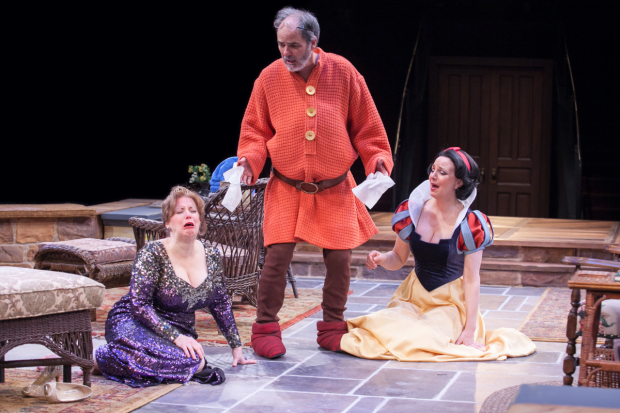Vanya and Sonia and Masha and Spike

(© C. Stanley Photography)
Winner of the 2013 Tony Award for Best Play, Vanya and Sonia and Masha and Spike is inspired by the plays of Anton Chekhov, but knowledge of Chekhov's works isn't needed to appreciate this wacky comedy, which takes place in a modern-day farm house located in pastoral Buck's County, Pennsylvania. In an exceptional revival at Arena Stage, Christopher Durang's Vanya and Sonia and Masha and Spike proves again the playwright's ability to create order out of chaos by putting uncommon characters in an improbable setting.
Vanya (Eric Hissom) and Sonia (Sherri Edelen) are the children of two academic community-theater enthusiasts, now dead. They live together in their family home in quiet desperation, with no social life. Sonia feels sorry for herself because she was adopted and considers herself an outsider. Vanya bemoans the fact that he has to listen to Sonia wailing about her fate every day. A cleaning woman named Cassandra (Jessica Frances Dukes) visits weekly. Those visits give her an opportunity to warn her employers to fear just about everything, from tornados to global warming.
Vanya and Sonia's sister, Masha (Grace Gonglewski), suddenly arrives. Masha is an aging actress who pays for Vanya and Sonia's expenses. She brings with her a young, dumb actor (and boy toy), Spike (Jefferson Farber).
Once Masha is on hand, things go downhill rapidly. She makes fun of Sonia and Vanya, and has contempt for their lack of sophistication. When a young woman from a neighboring house enters, she throws off the balance of power. Nina (Rachel Esther Tate) is pretty; Spike is attentive to her; Masha is wildly jealous.
Hissom is magnificent as the downtrodden Vanya, a closeted gay man in front of whom Spike delights in disrobing. His long paean to all the things he grew up with in the 1950s — telephones with circular dials, SPAM, carbon paper, stamps that required licking — is brilliantly written and stunningly delivered.
Edelen, who is hilarious as Sonia, has her best scenes when she outdoes Masha at a costume party, going as Maggie Smith in California Suite, and later when she tries to summon the courage to go on a date.
Gonglewski makes the most of Masha's vicious, egocentric nature, reveling in her "superiority" over her siblings.
Dukes is one of Washington's most capable actresses, and this play allows her to show her range. As Cassandra, the doomsday prophet, she speaks in deep-throated, Greek-tragedy mode, spiking the air with her long, brightly polished nails and flipping her long dreadlocks from side to side.
Farber is well cast as Spike, who loves displaying his body publicly, no matter who is watching. Tate also does well as the naive, idealistic Nina.
Director Aaron Posner intelligently brings out all the humor of Durang's writing. He moves the play at a moderate pace, so that all its humor can be savored. When Vanya and Sonia speak about nature, they adopt a dreamy, reverent tone usually heard in bad productions of Chekhov's plays: overall gloomy with touches of sadness. Their attitude is Durang's comment on modern directors who impose heavy "atmosphere" on Chekhov's works, turning them into unbearably dense soap-operas. Posner emphasizes Durang's savvy satire.
Daniel Conway's impressive in-the-round set shows the house's roof and a well-appointed living room, with plants and flowers both on and leading up to the stage. Paloma Young's costumes include Sonia's frumpy bathrobe, Masha's sexy black and red traveling outfit, and Cassandra's garish turquoise-and-salmon-patterned pants.
The original composition and sound design by James Sugg weaves bits of Russian-themed song throughout the show, ending with "All You Need Is Love."
Vanya and Sonia and Masha and Spike is neither an absurdist vision of Chekhov's writing nor a tribute to a particular play. It is a very funny reminder that Chekhov told marvelous stories about people struggling to survive their lives. The combination of Durang's witty, incisive writing and Posner's enlightened direction makes this production a farce with a point, a piercing comedy about the serious subject of how well and badly family members treat one another.










